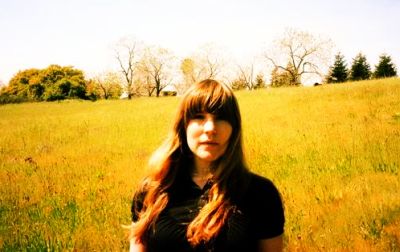I would like to sincerely thank Ms. Emily Jane White for the best interview I’ve conducted all year… not that I should be surprised (based on the title of her latest). The Oakland-based “Gothic-Folk” singer/songstress’ third fell-length, Ode to Sentience, is about to drop stateside June 12th on Antenna Farm Records (It’s already been out for a year and half in Japan, where she recently wrapped a string of May dates.) I once characterized White by saying, “She is in no hurry to escape her horrors; she recognizes the hopelessness and she braves an Opheliatic femininity in a way that only an artist who values beauty over the tragedy of circumstance would be capable.” Okay, so that characterization may be a bit lofty and she does come across as somewhat more “optimistic” than I would lead you to believe, but our recent chat proved that my initial thoughts on the artist were more or less accurate.
“When I first started songwriting I was really interested in Women’s Studies and American Studies. I was writing songs that were really a lot more influenced by the things I was interested in… I took a semiotics class in college… I learned that word [Sentience] in my semiotics course. It’s just magnificent and explains so much why people are drawn to music. I thought it was a really cool word. How we make sense of music and art is through this capacity to think, feel, experience.”
She goes on to explain how she finally decided on the title.
“What happened was I had this body of songs. I kept thinking to myself, ‘What am I going to call this record?’ The first two releases just took one song title. There would be substance behind it because it would have a song to go along with it that characterized the sound of the album”
Emily tells me that she takes album titles quite seriously, that they’re something very important to her: “I was bouncing ideas off of friends. I don’t want to compromise it and I also don’t want it to be shitty… I just can’t stand album titles that lack any depth.”
As far as where Emily Jane White fits into the spectrum of the music world as whole, both she and I struggled to come up with a good answer. She tells me that she’d really like a good slot as the opening act on some big tour, but neither of us could come up with a perfectly-paired touring mate for her. In retrospect, the only noteworthy names I can think of are Nick Cave and Peter Murphy… and it’s been about two decades since anyone cared enough to go see Peter Murphy. There’s always Rasputina, but I think White’s introspective, hyper-sincerity may be at odds with Melora’s, well, hyper-insincerity. Although she’s not exactly available to tour, every time I hear White I am moved to think of Nico, except Nico’s music sounds more like a postmodern appropriation of White’s.
Emily Jane White has always been dark and always been whimsical, above all else and her latest doesn’t stray from her previous work. It sounds as if it was written alone in the woods, on one exceptionally contemplative night. The album’s strongest track is its fourth, “The Black Oak,” it’s most stark and simplistic, both in musicality and content. It is when Emily is at her most stripped and most stark that she seems to shine the brightest… or darkest.
“This record is sort of much more of a personal exploration of my own issues. I’ve been in therapy for 15 years now. I could probably give you a psycho analysis of myself… Some of the songs really are more personal and about these dark experiences that I went through.”
In addition to cultural theory, Emily is also significantly inspired by “American gothic literature,” as she characterizes it. She has cited (both to me and otherwise) Emily Bronte’s Wuthering Heights, Toni Morrison’s Beloved, and Charlotte Perkins Gilman’s “The Yellow Wallpaper” as very substantial influences on her work. She finds them to be so inspiring because she finds “These race and gender issues are so much a part of American history.” “What do we do when we hear about these horrific realities?” she asks, before going on to say “As a white, middle-class woman, I realize that my subject position in this world is of a particular status.”
Unfortunately, Emily Jane White’s originally scheduled June 22nd date in Philadelphia is looking like it’s fallen through, but she is currently in the middle of a US tour. For those in cities that are lucky enough to see Ms. White, she says “I’m going to be playing a lot of songs off of the upcoming release, a few songs from Victorian America, and some new songs.” In terms of what she has planned for the rest of 2012, she says “I’m looking forward to just tying up loose ends, touring and finishing up the next record for next Spring.” (Yes, her fourth LP is already well in the works.)
Although she is still a relatively-unknown on the US music scene (despite positive critiques from the likes of Rolling Stone, Pitchfork, Spin, and NPR), she has garnered quite a bit of attention overseas, “I haven’t done any extensive amount of touring here… so I don’t really know who my audience is. Europeans seem to get it more.” She explains that she feels far too often, “People use music as a distraction,” as opposed to a significant outlet for exploring our existence: “It takes a particular type of person. I’m exploring those feelings that a lot of people don’t want to talk about, don’t want to express. Not everyone wants to hear this kind of music.”
*I would also like to thank Emily Uniacke, a recent student of mine, who is responsible for pointing out to me the existence of the word “darkle.”










